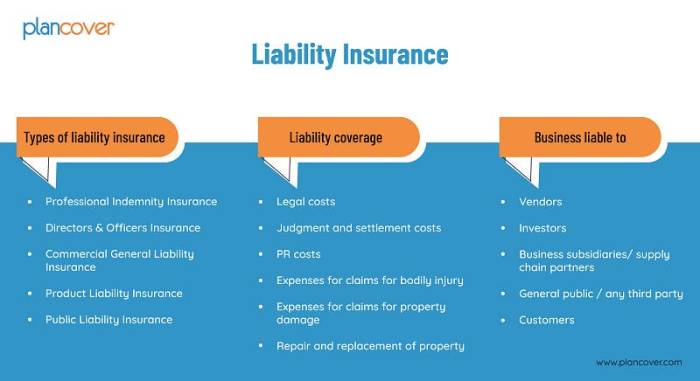Small Business Liability Insurance: A Step-by-Step Buying Guide
Embark on a journey through the intricacies of Small Business Liability Insurance with our comprehensive buying guide. Unravel the complexities of insurance coverage and discover how essential it is for the success of your business.
Understanding Small Business Liability Insurance
Small business liability insurance is a type of insurance coverage that protects business owners from financial losses resulting from lawsuits or claims filed against their business. It is essential for small businesses to have this type of insurance to safeguard their assets and ensure the continuity of their operations.
Types of Small Business Liability Insurance Coverage
- General Liability Insurance: This type of coverage protects businesses from claims related to bodily injury, property damage, and advertising injury.
- Professional Liability Insurance: Also known as Errors and Omissions Insurance, this coverage is essential for businesses that provide professional services, protecting them from claims of negligence or inadequate work.
- Product Liability Insurance: Businesses that manufacture, distribute, or sell products should have this coverage to protect them from claims related to injuries or damages caused by their products.
Key Benefits of Small Business Liability Insurance
- Financial Protection: Liability insurance helps cover legal expenses, settlements, or judgments that may arise from lawsuits, preventing significant financial losses for the business.
- Business Continuity: By having liability insurance, small businesses can continue their operations without the risk of being financially crippled by unexpected legal claims.
- Credibility and Trust: Having liability insurance can enhance the reputation of a small business, showing clients and partners that the business takes responsibility for its actions and has the means to address any potential liabilities.
Assessing Insurance Needs
To determine the appropriate level of liability insurance coverage for your small business, you need to assess your specific insurance needs. This step-by-step guide will help you navigate this process effectively.
Factors to Consider
- Size and nature of your business: Consider the size of your business operations, the industry you are in, and the potential risks associated with your specific business activities.
- Assets at risk: Evaluate the value of your business assets that could be at risk in the event of a liability claim, including property, equipment, and inventory.
- Revenue and budget: Assess your annual revenue and budget constraints to determine how much insurance coverage you can afford while ensuring adequate protection.
- Legal requirements: Research the legal requirements for liability insurance in your industry and locality to ensure compliance with regulations.
Coverage Options
Small businesses have various coverage options to choose from based on their specific needs. Here is a comparison of the most common types of liability insurance:
| Type of Insurance | Coverage Details |
|---|---|
| General Liability Insurance | Provides coverage for third-party bodily injury, property damage, and advertising injury claims. |
| Professional Liability Insurance | Designed for service-based businesses, offering protection against claims of negligence, errors, or omissions. |
| Product Liability Insurance | Covers liability arising from the sale of products that cause injury or damage to consumers. |
| Commercial Property Insurance | Protects your business property, equipment, and inventory from damage or loss due to covered perils. |
Selecting an Insurance Provider
When it comes to choosing an insurance provider for small business liability coverage, there are several key factors to consider. Researching and comparing quotes from different insurance companies is crucial in finding the right fit for your business. Evaluating the reputation and financial stability of insurance providers can also help you make an informed decision.
Factors to Consider
- Coverage Options: Look for an insurance provider that offers the specific types of coverage your business needs, whether it be general liability, professional liability, or product liability.
- Cost: Compare quotes from multiple insurance companies to ensure you are getting the best value for your coverage.
- Customer Service: Consider the level of customer service provided by the insurance provider, as you may need to rely on them in the event of a claim.
- Claims Process: Look into the claims process of each insurance provider to understand how efficiently and effectively they handle claims.
Researching and Comparing Quotes
It is essential to research and compare quotes from different insurance companies to ensure you are getting the most competitive rates for the coverage you need. Be sure to provide accurate information about your business when requesting quotes to receive the most accurate pricing.
Evaluating Reputation and Financial Stability
Before selecting an insurance provider, take the time to evaluate their reputation and financial stability. Look for reviews and ratings from other small business owners to get a sense of the provider's customer satisfaction. Additionally, check the financial strength ratings of the insurance company to ensure they can meet their financial obligations.
Understanding Policy Terms and Conditions
When it comes to small business liability insurance, it is crucial to have a clear understanding of the policy terms and conditions. Let's delve into common terms and conditions that you may encounter in these insurance policies.
Coverage Limits
Insurance policies specify the maximum amount the insurer will pay for covered claims. It is essential to review these limits carefully to ensure they align with your business's needs and potential risks.
- General Liability Coverage: Typically covers bodily injury, property damage, and personal injury claims up to a certain limit.
- Professional Liability Coverage: Limits may vary based on the nature of the professional services provided by your business.
Exclusions
Exclusions are specific situations or types of claims that are not covered by the insurance policy. Understanding these exclusions is crucial to avoid any surprises when filing a claim.
- Intentional Acts: Insurance policies usually do not cover damages resulting from intentional acts or illegal activities.
- Employee Injuries: Workers' compensation insurance typically covers employee injuries, so they may be excluded from general liability policies.
Endorsements
Endorsements are amendments or additions to the standard insurance policy that provide extra coverage for specific risks. It is essential to consider adding endorsements that address your business's unique needs.
- Hired and Non-Owned Auto Liability: Provides coverage for vehicles not owned by the business but used for business purposes.
- Cyber Liability Endorsement: Offers protection against data breaches and cyber-attacks, which are becoming increasingly common in the digital age.
Epilogue

In conclusion, navigating the realm of Small Business Liability Insurance can be daunting, but armed with the knowledge from our guide, you can make informed decisions to protect your business.
Common Queries
What factors should small business owners consider when determining coverage levels??
Small business owners should consider the nature of their business operations, potential risks, and financial capabilities when determining coverage levels.
How can small business owners evaluate the reputation of insurance providers??
Small business owners can evaluate the reputation of insurance providers by checking online reviews, asking for referrals, and researching the company's history and customer satisfaction ratings.




